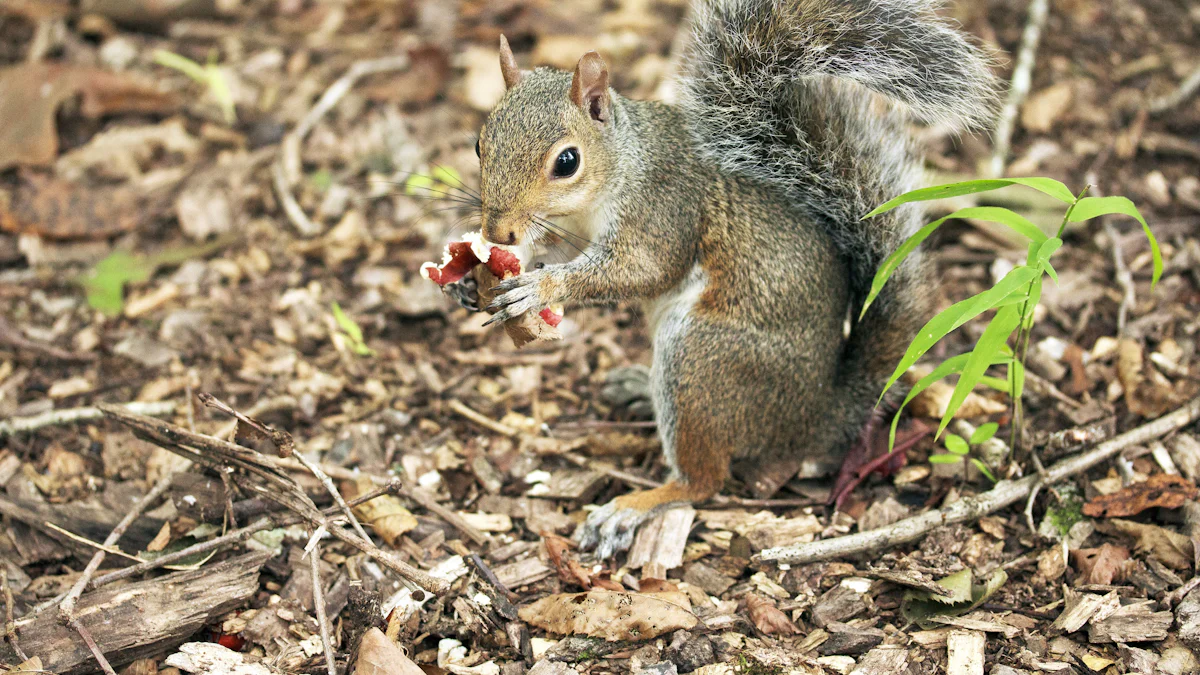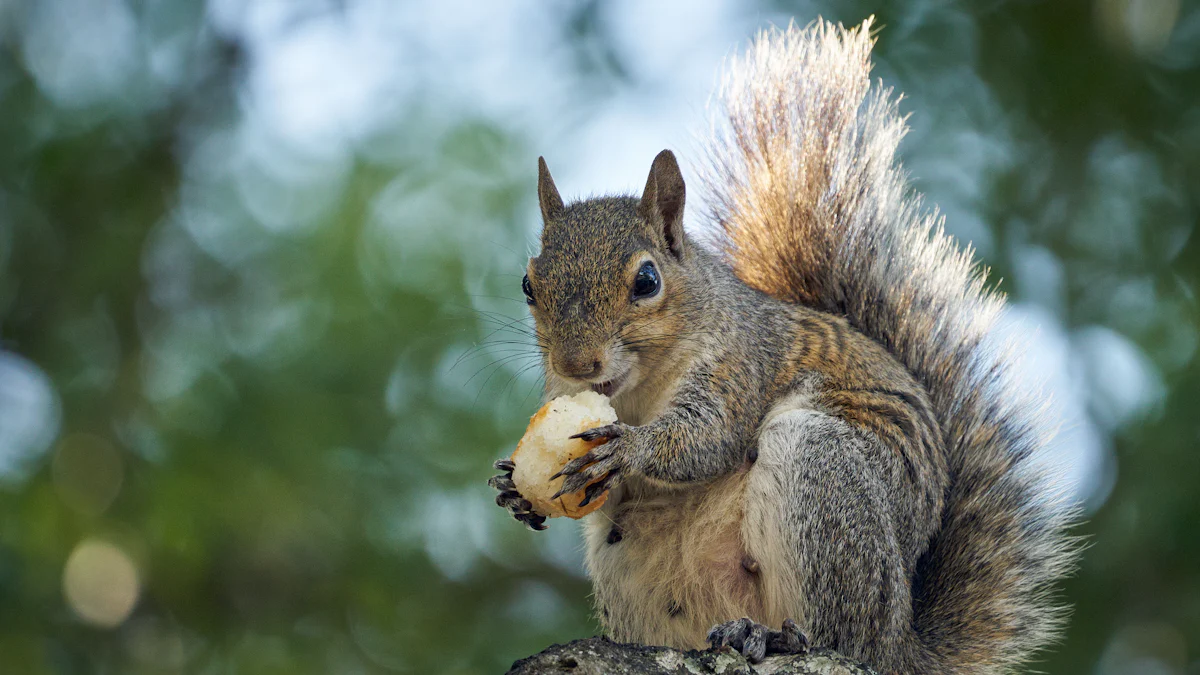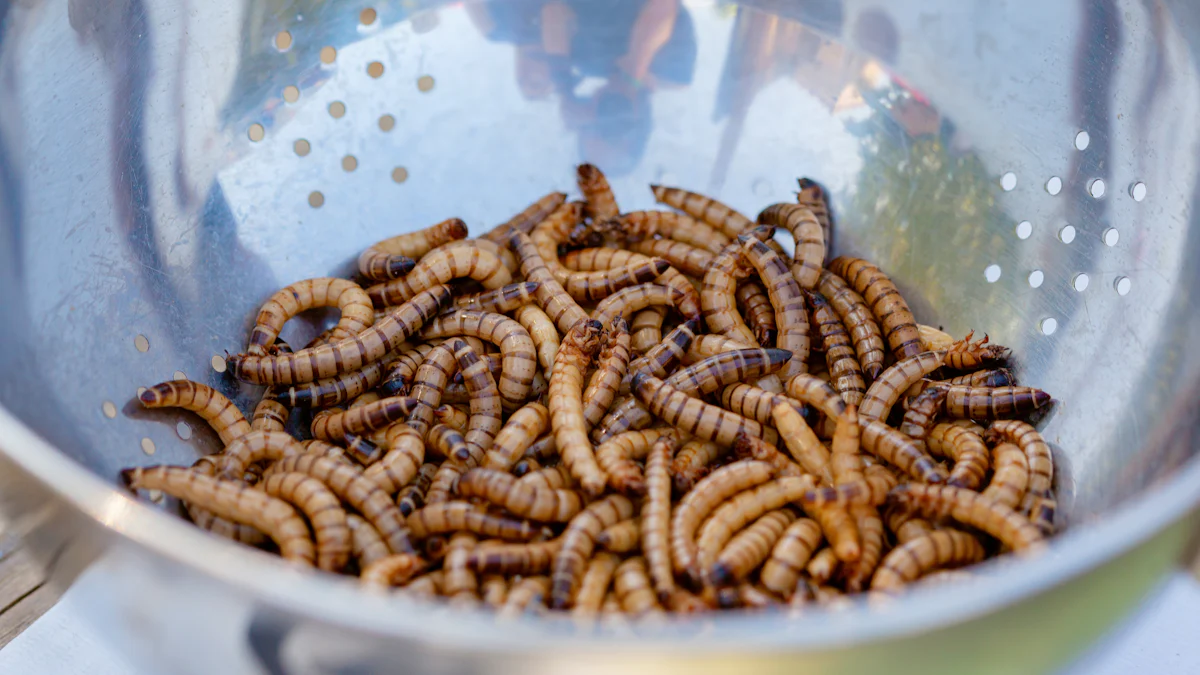
Squirrels love to snack on dried mealworms when they get the chance. These tiny treats are packed with protein and fat, giving squirrels the energy they need to stay active. While mealworms aren’t part of a squirrel’s natural diet, their high nutritional value makes them hard to resist. Squirrels are opportunistic feeders, meaning they’ll eat whatever is available, and mealworm food often becomes an easy target. Whether it’s for a quick boost or just curiosity, squirrels won’t hesitate to munch on these protein-rich snacks.
Key Takeaways
- Squirrels are opportunistic feeders and will eat dried mealworms for their high protein and fat content, which provides essential energy.
- While mealworms can be a nutritious treat, they should only be offered occasionally to avoid disrupting a squirrel’s balanced diet.
- Dried mealworms are convenient to store and have a long shelf life, making them an accessible option for feeding wildlife.
- To prevent squirrels from raiding bird feeders, consider using squirrel-proof feeders and placing them strategically away from climbing structures.
- Providing alternative food sources, like a dedicated squirrel feeder, can help keep squirrels satisfied while allowing birds to enjoy their mealworm food.
- A varied diet that includes nuts, seeds, and fruits is crucial for maintaining the health and energy levels of squirrels.
Why Are Squirrels Attracted to Mealworm Food?

Nutritional Value of Mealworms
Mealworms pack a punch when it comes to nutrition. These tiny insects are loaded with protein, which helps squirrels repair muscles and grow stronger. For young squirrels, this protein boost can be especially helpful during their rapid growth stages. Mealworms also contain fats, including unsaturated fatty acids, which contribute to a squirrel’s shiny fur and overall health. These fats provide energy, keeping squirrels active and agile throughout the day.
Compared to fresh mealworms or other natural foods like nuts and seeds, dried mealworms offer an even more concentrated source of nutrients. The drying process removes water, leaving behind a dense, nutrient-rich snack. This makes mealworm food a tempting option for squirrels, especially when they need extra energy or are preparing for colder months.
Another advantage of dried mealworms is their convenience. Unlike live insects, dried mealworms don’t spoil quickly and are easy to store. You can keep them on hand year-round, making them an accessible treat for wildlife, including squirrels. Their long shelf life and portability also make them a popular choice for people who enjoy feeding animals in parks or backyards.
Opportunistic Feeding Habits of Squirrels
Squirrels are known for their opportunistic feeding habits. They don’t stick to a strict diet and will eat whatever is available. If you’ve ever seen a squirrel rummaging through trash or stealing birdseed, you know how resourceful they can be. When mealworm food is left out, squirrels see it as an easy and nutritious snack.
Their adaptability allows them to thrive in various environments. Whether they’re in a forest or your backyard, squirrels constantly search for food that meets their energy needs. Mealworms, with their high protein and fat content, fit the bill perfectly. Even though mealworms aren’t a natural part of their diet, squirrels won’t hesitate to take advantage of this convenient food source.
This opportunistic behavior also explains why squirrels often raid bird feeders. They’re not picky and will happily munch on anything that provides a quick energy boost. If you leave mealworm food out for birds, don’t be surprised if a squirrel sneaks in for a bite. Their curiosity and adaptability make them excellent scavengers, always ready to explore new food options.
Is Mealworm Food Safe for Squirrels?
Benefits of Occasional Consumption
Mealworm food can be a beneficial snack for squirrels when offered occasionally. Packed with protein, mealworms help squirrels maintain strong muscles and support their physical activity. This is especially important during times when squirrels need extra energy, like in colder months or when they’re preparing for winter. The fats in mealworms, particularly unsaturated fatty acids, also contribute to a squirrel’s overall health. These fats can enhance their fur’s shine and provide the energy they need to stay agile.
Another advantage of mealworm food is its convenience. Unlike fresh insects, dried mealworms don’t spoil quickly. You can store them for long periods, making them an easy option for feeding wildlife. If you enjoy watching squirrels in your backyard or at the park, offering mealworm food occasionally can attract them and give you a closer look at their playful behavior. However, it’s important to remember that mealworms should only be a treat, not a staple in their diet.
Risks of Overconsumption and Importance of a Balanced Diet
While mealworm food offers nutritional benefits, overfeeding it to squirrels can lead to problems. Squirrels thrive on a varied diet that includes nuts, seeds, fruits, and vegetables. Relying too much on mealworms can disrupt this balance and cause nutritional deficiencies. For example, mealworms lack certain vitamins and minerals that squirrels get from their natural diet. Over time, this imbalance could affect their health and energy levels.
Another risk of overconsumption is weight gain. Mealworms are calorie-dense due to their high fat content. If squirrels eat too many, they might gain excess weight, which can make it harder for them to climb trees or escape predators. To keep squirrels healthy, it’s best to limit how often you offer mealworm food and ensure they have access to other natural food sources.
If you’re feeding wildlife, consider providing a mix of foods. Nuts, seeds, and fresh fruits can complement mealworms and help squirrels maintain a balanced diet. By doing this, you’ll not only keep them healthy but also enjoy watching a variety of their natural behaviors.
How to Prevent Squirrels from Eating Mealworm Food Meant for Birds

Squirrels can be persistent when it comes to snacking on mealworm food meant for birds. Their cleverness and determination often make it challenging to keep them away. However, with a few smart strategies, you can protect your bird feeders and ensure the birds get their share.
Use of Squirrel-Proof Feeders
Investing in squirrel-proof feeders is one of the most effective ways to keep squirrels out of bird food. These feeders are designed with mechanisms that block access when a squirrel’s weight triggers them. For example, some feeders have spring-loaded perches that close the feeding ports when a heavier animal, like a squirrel, lands on them. This clever design ensures that only lightweight birds can access the food.
“Squirrels trying to access bird feeders can deter birds from visiting and potentially damage the feeders.”
By using squirrel-proof feeders, you not only protect the mealworm food but also prevent squirrels from damaging your feeders. These feeders are widely available and come in various styles, so you can choose one that fits your backyard setup.
Strategic Placement of Feeders
Where you place your feeders plays a big role in keeping squirrels away. Squirrels are excellent climbers and jumpers, so you’ll need to think strategically. Place your feeders at least 10 feet away from trees, fences, or any structures that squirrels can use to leap onto the feeder. Hanging feeders on poles with baffles can also make it harder for squirrels to climb up.
If you’re dealing with particularly determined squirrels, consider suspending your feeders on a wire strung between two points. Adding plastic or metal spinners to the wire can make it even trickier for squirrels to reach the food. These small adjustments can go a long way in protecting your mealworm food.
Providing Alternative Food Sources for Squirrels
Sometimes, the best way to keep squirrels away from bird feeders is to give them their own food source. Setting up a dedicated squirrel feeder filled with inexpensive treats like corn, sunflower seeds, or peanuts can satisfy their hunger and distract them from the bird feeders. Place the squirrel feeder in a separate area of your yard, far from where the birds feed.
By offering squirrels an alternative, you create a win-win situation. The squirrels get their own snacks, and the birds can enjoy the mealworm food without interruptions. This approach also allows you to enjoy watching both squirrels and birds in your yard without conflict.
Squirrels find mealworm food irresistible because of its high protein and fat content, which supports their energy needs and overall health. While it’s safe to offer mealworms occasionally, you should avoid making them a primary part of a squirrel’s diet. A balanced diet with nuts, seeds, and fruits is essential for their long-term well-being. To ensure birds get their share of mealworm food, consider using squirrel-proof feeders, placing feeders in hard-to-reach spots, or providing squirrels with their own food sources. These strategies create harmony in your backyard while keeping both birds and squirrels happy.
FAQ
Do squirrels eat mealworms?
Yes, squirrels do eat mealworms. They are opportunistic feeders, meaning they’ll eat whatever is available. Mealworms provide a great source of protein and fat, which makes them appealing to squirrels. However, mealworms shouldn’t replace the natural diet of nuts, seeds, fruits, and vegetables that squirrels rely on for balanced nutrition.
Are mealworms a natural part of a squirrel’s diet?
No, mealworms aren’t a natural part of a squirrel’s diet. Squirrels typically eat nuts, seeds, fruits, and green vegetation. However, their resourceful nature allows them to adapt to different food sources, including mealworms, especially when other options are scarce.
Why do squirrels eat mealworms meant for birds?
Squirrels eat mealworms meant for birds because they’re high in protein and fat, which are essential for energy and health. Their opportunistic feeding habits make them quick to take advantage of any accessible food, including mealworms left out for birds. If you’re a bird enthusiast, this can be frustrating, but there are ways to manage it.
How can I stop squirrels from eating mealworms intended for birds?
You can stop squirrels from eating mealworms by using these strategies:
- Squirrel-proof feeders: These feeders block access when a squirrel’s weight triggers the mechanism.
- Strategic placement: Place feeders at least 10 feet away from trees or structures squirrels can climb.
- Alternative food sources: Set up a separate feeder with treats like peanuts or sunflower seeds to distract squirrels.
These methods help ensure your bird visitors enjoy their mealworms without interference.
Are mealworms safe for squirrels?
Mealworms are safe for squirrels when given occasionally. They provide protein and healthy fats that support muscle repair and energy. However, overfeeding mealworms can lead to nutritional imbalances or weight gain. It’s best to offer them as a treat rather than a staple food.
Can feeding squirrels mealworms harm them?
Feeding squirrels too many mealworms can harm them. Mealworms lack some vitamins and minerals found in a squirrel’s natural diet. Overconsumption may lead to deficiencies or excessive weight gain. To keep squirrels healthy, provide a variety of foods like nuts, seeds, and fruits alongside occasional mealworms.
Do squirrels prefer mealworms over other foods?
Squirrels generally prefer nuts, seeds, and fruits over mealworms. However, they’ll eat mealworms if they’re available, especially during times when other food sources are limited. Their adaptability makes them open to trying new foods, even if it’s not their first choice.
Should I feed mealworms to squirrels?
You can feed mealworms to squirrels, but only in moderation. Mealworms are a good occasional treat due to their high protein and fat content. However, they shouldn’t replace the diverse diet squirrels need to stay healthy. Always prioritize natural foods like nuts and fruits.
Do mealworms attract other wildlife besides squirrels?
Yes, mealworms attract other wildlife, including birds, hedgehogs, and even some reptiles. If you leave mealworms out, you might notice a variety of animals visiting your yard. While this can be exciting, it’s important to monitor how much food you’re providing to avoid overfeeding any species.
What’s the best way to store dried mealworms?
Store dried mealworms in an airtight container in a cool, dry place. This prevents spoilage and keeps them fresh for longer. Unlike live insects, dried mealworms are easy to store and convenient to use, making them a popular choice for feeding wildlife.


